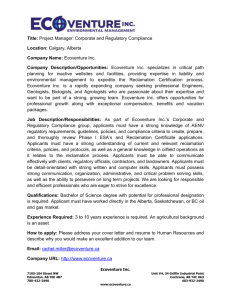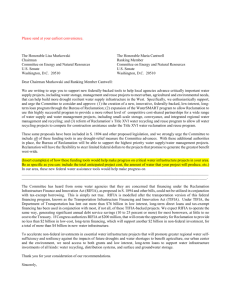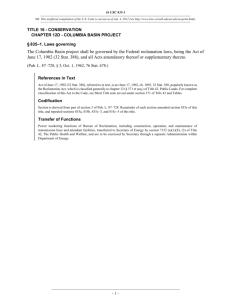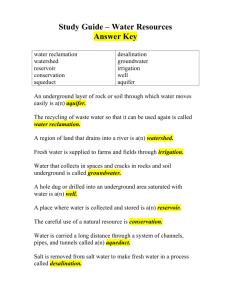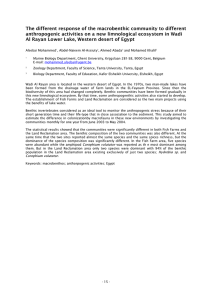Administrator of the Year Award Presented Posthumously To John W. Keys, III
advertisement
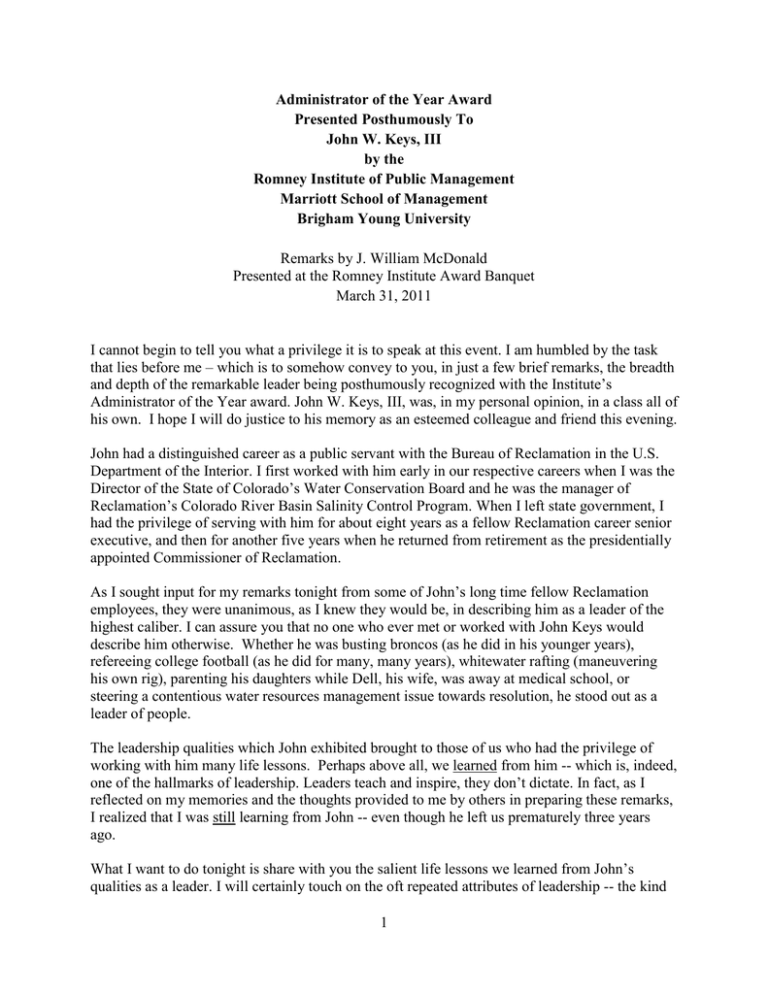
Administrator of the Year Award Presented Posthumously To John W. Keys, III by the Romney Institute of Public Management Marriott School of Management Brigham Young University Remarks by J. William McDonald Presented at the Romney Institute Award Banquet March 31, 2011 I cannot begin to tell you what a privilege it is to speak at this event. I am humbled by the task that lies before me – which is to somehow convey to you, in just a few brief remarks, the breadth and depth of the remarkable leader being posthumously recognized with the Institute’s Administrator of the Year award. John W. Keys, III, was, in my personal opinion, in a class all of his own. I hope I will do justice to his memory as an esteemed colleague and friend this evening. John had a distinguished career as a public servant with the Bureau of Reclamation in the U.S. Department of the Interior. I first worked with him early in our respective careers when I was the Director of the State of Colorado’s Water Conservation Board and he was the manager of Reclamation’s Colorado River Basin Salinity Control Program. When I left state government, I had the privilege of serving with him for about eight years as a fellow Reclamation career senior executive, and then for another five years when he returned from retirement as the presidentially appointed Commissioner of Reclamation. As I sought input for my remarks tonight from some of John’s long time fellow Reclamation employees, they were unanimous, as I knew they would be, in describing him as a leader of the highest caliber. I can assure you that no one who ever met or worked with John Keys would describe him otherwise. Whether he was busting broncos (as he did in his younger years), refereeing college football (as he did for many, many years), whitewater rafting (maneuvering his own rig), parenting his daughters while Dell, his wife, was away at medical school, or steering a contentious water resources management issue towards resolution, he stood out as a leader of people. The leadership qualities which John exhibited brought to those of us who had the privilege of working with him many life lessons. Perhaps above all, we learned from him -- which is, indeed, one of the hallmarks of leadership. Leaders teach and inspire, they don’t dictate. In fact, as I reflected on my memories and the thoughts provided to me by others in preparing these remarks, I realized that I was still learning from John -- even though he left us prematurely three years ago. What I want to do tonight is share with you the salient life lessons we learned from John’s qualities as a leader. I will certainly touch on the oft repeated attributes of leadership -- the kind 1 of stuff that you, graduates, find in every management text book -- for John certainly reflected the textbook model of leadership. But I will endeavor to search more deeply than that. I will try to help you understand what distinguished John Keys from other leaders – what set him apart. Leadership starts, in my view, with integrity. John had it. As one of my colleagues put it: “There was Abraham Lincoln, and then there was John Keys.” But he was more than an honest Abe, a man good for his word and who was scrupulous with the facts. He was also intellectually honest, able to acknowledge the strength of a counter argument on a policy issue, or a perspective different from his. And he was sincere. If he said it, he meant it – it wasn’t contrived simply to placate or to deflect, and certainly never to deceive even when he was appointed in a political office. If he couldn’t say what was on his mind because he was biting his tongue, then he simply got red faced with frustration -- and you got the message all the same. John was also a man of strong moral character, another indispensible element of leadership. His ethical standards were not merely the minimum required by the government’s Code of Ethics. He went above and beyond, and he expected the same of you. He regarded public service, as do I, as an honor and privilege that should never be tarnished by personal gain or aggrandizement, nor by cutting any corners. In his every action he showed us that we must always take the high road as public servants -- doing the right thing for the right reason. He refused to stoop to the level of others, but rather by his own actions always sought to encourage them to raise themselves up to his standards of public service. John was smart. An engineer by training, he had a strong intellect. But he had more than mere smarts. He was curious, always willing to learn something new, a voracious reader. And he was always willing to seek out and understand an opposing point of view as he considered the public policy decisions before him. Smarts alone, however, do not make a leader. Indeed, many a potential leader has been “too smart” for their own good. What John showed us by his every day actions is that a real leader leavens his intellectual gifts with a healthy dose of humility. John was always humble, never ever “full of himself.” It was one of his many abiding qualities. He was quick to praise others, give credit where credit was due, and profusely thank you for your efforts. Indeed, his handwritten thank you notes are legendary in Reclamation. Every airplane trip he took I think he must have had postcards with him. He’d jot notes on them to employees – from the folks in the mail room to his senior management counterparts – and to friends in the water users’ community. Even with the time pressures of being the Commissioner, he continued that practice. To this day, I still see his notes pinned or taped to employee’s office walls – a personal connection to their leader that motivated them to do their best for him. Employees and water users weren’t the only ones to receive his postcards. His daughters did too, as Dad kept in touch with them in this way on his many business and personal trips. A postcard from John was a treasured privilege I know both for daughters and for employees. One way in which John’s humble, down-to-earth, character manifested itself was in his keen wit. He had a penchant for telling a good joke – especially one in which the engineers outfoxed the 2 lawyers. Being of the latter persuasion by training, I learned quickly to have my own arsenal of jokes at hand, reversed of course as to who got the upper hand as between the two professions. The upshot was that John and I exchanged frequent phone calls to see who could outdo whom with the latest joke. I didn’t keep track of the results – it was no contest! He also loved a good practical prank. One of my favorite stories is about the red handkerchief John always carried. This prompted one of his employees, who was a dyed in the wool customer of John Deere tractors, to give him a yellow handkerchief with green tractors on it, the colors of the John Deere Company. John was, I am told, never seen to carry this John Deere handkerchief. Rather, if he was at the head table at a water users meeting and this employee was in the audience, John would get out his trusty red handkerchief and make a major show of using it to catch this employee’s attention. According to the employee, words were never exchanged about this ritual between John and he, which illustrates so richly why John’s practical joking endeared him to his staff – they connected with him because he was down to earth. He was simply one person on the team, neither above nor more important than anyone else. Indeed, John insisted on team work – everyone pulling together. He surrounded himself with the best and the brightest, supported and encouraged them, and trusted them to do the right thing. He valued and respected their work, affirmed their contribution to the team, and more likely than not, wrote each of them one of those postcards I mentioned a moment ago to say thanks for a job well done. But if, per chance, you disappointed him, he did not look the other way, seeking to avoid the tough call, hoping the problem would go away. No, he would let you know, gently but unequivocally, that you had let the team down, that you had let him down and that was not acceptable. Rarely did any of John’s employees ever fail the team a second time. John also taught us that a good leader is a good listener – you have two ears and one mouth, use them in that proportion. He took care to listen to the concerns of his employees and to the views of the constituents with whom he worked. He was a consensus builder, always trying to find the win-win solution. Many times those around the table would have only one thing in common, and that was their trust in, and respect for, John. They knew he would listen, carefully consider their views, and treat them fairly. To the water user community, John was a giant of a man – always looking for a way to help them, but leaning over backwards to be fair to them when, by force of law or policy, he had to do the right thing. By now you have perhaps begun to detect a thread that ties these foregoing leadership qualities together – a thread that uniquely defined John Keys as a leader that made him stand out above all others. And that is the genuinely personal connection he made with everyone. He cultured relationships with staff and constituents through his humility, integrity and trustworthiness, personal gestures, and taking time to listen. But even more importantly, if John met you, then he made every effort to get to know you as an individual -- to empathize and sympathize with you, to encourage and support you, and to help you, professionally and personally, when you needed it. 3 Just as John’s thank you notes to individual employees are legendary in Reclamation, so too was his knack for remembering names – not just yours, but your spouse’s, your kids’, even your grandparents’ names. But it was more than just a knack for names. He was also known to study staff directories before he made a trip to a field office, ensuring that he would know folks’ names when he got there. While it was a knack, it was also something he studied because he understood the importance of that personal connection. And when he saw you in the hallway or at a meeting, he would always ask, “how is so and so doing?” But he didn’t merely ask in passing. He was truly interested in how you were and what was going on in your life. One story even has John asking about Jake. “John”, says the amazed employee, “how in the world do you know my dog’s name?” His response was nothing but a wink and a smile. Lesson learned -- listen carefully. The motivational power of such personal connections is remarkable. As one colleague put it, “When John shone his light on you, you felt that you could accomplish anything.” This was a leader – a man you wanted to follow, a man who it was a privilege to follow. Equally powerful were the concern, care, and compassion which John had for those who needed a boost. He showed his care and concern in very unassuming ways, but you couldn’t help but notice and be inspired by his example. Let me share a few of those with you. John encouraged the staff in the regional office to develop a program to be mentors to elementary schools, and then exercised the authority which federal agencies have to establish flexible work hours to enable those employees who desired to volunteer to participate in this monthly mid-day “Lunch Buddies” program. This program continues to this day in the regional office in Boise. In another instance, John was instrumental in helping to organize a volunteer program called Catch a Special Thrill – or C.A.S.T. -- for Kids program, which is celebrating its 20th anniversary this year. C.A.S.T. for Kids provides disabled children the opportunity to spend a day fishing, and started out one summer with just a few events at Reclamation reservoirs in the Pacific Northwest staffed by Reclamation employee volunteers, with boats and drivers donated by local groups (such as the BASS Federation) and fishing equipment provided by local sporting goods stores and manufacturers. This year, from the seed of that plot and John’s willingness to have federal employees step up and be a model to their community, there are about 45 such events scheduled from Virginia to California and all points in between. Many, many hundreds of disabled children have had the opportunity to go fishing on a big boat and catch a big fish. If you have ever gone to one of those events as a volunteer, you will never forget the size of a smile you can get on a face when they catch a fish for the first time. And, of course, he knew a name – even of the homeless street people who he saw everyday in Washington, D.C., as he walked from his subway stop to the Commissioner’s office. He didn’t just pass them by -- he stopped and talked, learned their names, got to know them a bit, and brought them hotel toiletries from his countless trips as Commissioner. And, I must assume that he told them the latest lawyer joke that he had heard. 4 Finally, John was always a very strong supporter of education. For example, he promoted the use of the authorities that permit federal agencies to hire students while they are still going to college and prepare them for Reclamation careers with on-the-job experience. He carried this a step further by organizing a voluntary effort among employees to create a scholarship fund for disadvantaged students at Boise State University so that scholarship assistance could be provided to those in the work-study program in need of financial help. To this day, employees in the regional office still undertake volunteer fund raising events for what they have renamed the John W. Keys, III, Memorial Scholarship Fund. And he strongly supported the vocational training programs offered by the Jobs Corps for disadvantaged young people, even though the Job Corps program had nothing to do with Reclamation’s mission to operate and maintain water projects – indeed, had nothing to do with whether John would be judged a successful executive in Reclamation. Nonetheless, he took great pride in the three Jobs Corps Centers which Reclamation ran for the U.S. Department of Labor, and was as enthusiastic visiting the centers as much as making any field trip to a water project. He also saw in the Job Corps program the opportunity to recruit women and minorities into Reclamation by offering Reclamation’s work-study program to those kids who went onto college from the Job Corps. His willingness to help in this way had a lasting impact on all to whom he, and his wife Dell, reached out. A particularly poignant example of this was shared by a young woman, Christina Caswell, at a gathering of employees and retirees which we had in the regional office a few days after John passed away. In remembrance of John, we simply invited those who wished to do so to share their memories of him – of what John had meant to them. Christina was in the Job Corps program when John was the Regional Director in Boise. She happened to be going through the program at a time when the Job Corps began offering the opportunity to its student to also begin their college careers. Christina became one of the first people to do that, working for Reclamation as a student intern at the same time. Her remarks to her fellow employees, which I use here with her permission, sum up far more eloquently than can I the lessons to be learned from the leadership provided by the public service career of John Keys. VIDEO CLIP (not available) John Keys, as are all worthy of being called a leader, was honest, smart, politically savvy, a hard worker, and a good decision maker. But, to paraphrase from another of my colleagues, John Keys’ leadership as a public servant and administrator is marked not by what he accomplished as an engineer or a senior executive, but by how he made the employees who worked for him feel and how each and every one of them wanted to do their best work for John. As you just saw in the personal testimonial of Christina, if you, graduates are to be great leaders, you will care about your fellow employees and you will know their stories, not just their names. Thank you.. 5

